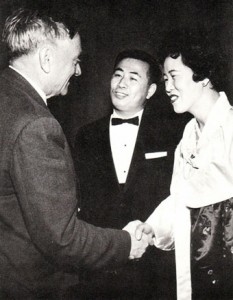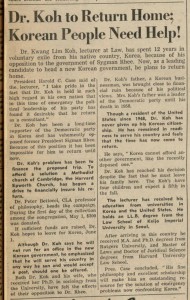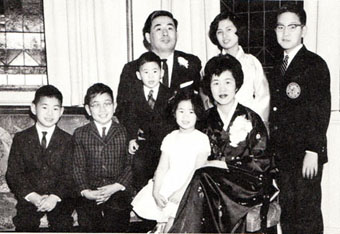Dr. Ko Kwang-lim, Dr. Ko Hyeseong-Cheon and the Ko family

The Ko family were leading representatives of the Korean intellectual diaspora in the Boston area in the mid-twentieth century. Dr. Ko Kwang-lim (1920–1989), an international law scholar and acting ambassador from South Korea to the United States (1960), earned his master’s and doctoral degrees in Political Science from Rutgers University and master’s and doctoral degrees in international law from Harvard Law School in 1955—the first Korean ever to receive a doctorate from Harvard Law School. His wife, Dr. Ko Hyeseong-Cheon (1929–), a scholar of comparative culture studies and chair of East Rock Institute (the oldest research organization on Korean and Korean Diaspora culture in the U.S.), received a master’s degree in 1953 and a Ph.D. in sociology and anthropology from Boston University in 1959—the fourth Korean woman to receive an American doctorate.
Dr. Ko Kwang-lim began his career as a professor at Boston University Law School and later taught at Yale Law School, Hofstra University, and Central Connecticut State University, where he directed the Center for Area and Interdisciplinary Studies. He was the first Korean professor of law in the United States and the author of numerous books and articles on law, political science, and American studies. Dr. Ko Hyeseong-Cheon taught at Boston University, Albertus Magnus College, and Yale University. The Ko’s shared the distinction of being the first Asian Americans to teach at Yale. She was also a Visiting Professor at the National Museum of Ethnology in Osaka, Japan, and at the International Research Center for Japanese Studies in Kyoto, Japan. Of her many writings, two books, Authentic Leadership in Multicultural Society (2006) and Authentic Women’s Leadership (2007) became best sellers in Korea and have been translated into Japanese and Chinese.
In the 1950s, Drs. Ko Kwang-lim and Hyeseong-Cheon were instrumental in establishing the first Korean studies program at Harvard University under the direction of Professor Edwin O. Reischauer. They also founded the Korea Institute in Cambridge, Massachusetts, in 1956 in order to promote academic and cultural exchange between the United States and Korea and to lay groundwork for Korean studies in the U.S. A decade later, they initiated annual conferences of Koreans and Korean Americans at Central Connecticut State University. In the 1960s, the Korea Institute moved near the campus of Yale University and became what is now the East Rock Institute (ERI).

Dr. Ko Hyeseong-Cheon has been a driving force in the teaching of Korean studies at Yale, carrying out research, publications, and leadership training at ERI. One of her most significant contributions to Korean studies has been the development of cultural information systems called the Human Relations Area Files Cultural Information System (HACIS), the HRAF Automated Bibliographic System (HABS), and Korean Cultural Information System (KOCIS). These projects necessitated the major task of digitization of Chinese, Japanese, and Korean character sets for the UNESCO World Information System, working in collaboration with the National Museum of Ethnology in Osaka, Japan. She also served as a member of the U.S. National Academy of Science’s National Research Council and was the U.S. Representative of the Social Science Research Council to the World Information System, UNESCO, in the late 1960s and 1970s. She was the key consultant to the development of the National Museum of Ethnology, Osaka, Japan, information system in early 1980s. Furthermore, she initiated the first teacher training and curriculum development on East Asia and Korea with a National Endowment for the Humanities Foundation grant in 1985-7, and in 2000, she developed an award-winning teaching website on Korean cultural values, www.instrok.org.

Their contribution was not limited to the area of higher education. In 1960, the Prime Minister of the Republic of Korea, Jang Myeon appointed Dr. Ko Kwang-lim to be Envoy Extraordinary and Minister Plenipotentiary, first to the Korean Mission at the United Nations and then to the Korean Embassy in Washington. For a time, he served as acting ambassador to the United States from South Korea. When the South Korean government was overthrown by a military coup by General Park, in 1961, he argued against its legitimacy to the U.S. Senate and House of Representatives. While living in the Boston area, the Ko family home became an intellectual and social hub for Korean students, scholars, and visitors, holding regular weekly meetings called Hanhoe to discuss how to bring democracy to Korea. The Drs. Ko also played an important role in initiating the first Korean church in Boston and the Korean American Society of Boston.

Their four sons and two daughters are among the most influential Asian Americans in both academia and public service: Both of their daughters, Carolyn Ko Kyeongsin (Ph.D., Massachusetts Institute of Technology) and Jean Ko Kyeongeun Peters (J.D., Harvard Law School) are university professors. Carolyn Ko Kyeongsin is a professor of Chemistry and Dean Emerita of the School of Natural Science at Joongang University in Seoul, Korea, and Jean Ko Kyeongeun Peters is Sol Goldman Clinical Professor of Law and Supervising Attorney at Yale Law School. Two of their sons, Howard Kyeongju (M.D. Yale University, M.Ph. Boston University) and Harold Hongju (J. D. Harvard Law School), were appointed to government posts by the Obama administration in 2009. Howard Ko Kyeongju, the former Associate Dean of the Harvard School of Public Health and former Massachusetts Public Health Commissioner, currently serves as the Assistant Secretary for Health. Harold Ko Hongju, a former Dean of the Yale Law School and Legal Adviser of the U.S. Department of State, is the Sterling Professor of International Law at Yale Law School. Edward Ko Tongju (MD., Ph.D., Harvard Medical School and Massachusetts Institute of Technology) is an anesthesiologist working in the Boston area, and Richard Ko Jongju (MFA, School of Visual Arts) served as an Assistant Dean and Director of Asian American Student Affairs at Yale University.
Written by: Daewon Moon
Edited by: Doug Tzan
Other Resources of Interest on the Ko Family:
Phil Tajitsu Nash, “Justice Blackmun’s ‘Hwegap’,” Washington Journal, March 12, 2004.
________, “The Deaning of Our Law Schools,” Washington Journal, July 2, 2004.